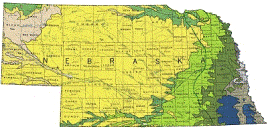United States Geological Survey

United States Geological Survey: Staff Publications
Document Type
Article
Date of this Version
2007
Citation
Remote Sensing of Environment 106 (2007) 399–413; doi:10.1016/j.rse.2006.09.017
Abstract
Rangeland carbon fluxes are highly variable in both space and time. Given the expansive areas of rangelands, how rangelands respond to climatic variation, management, and soil potential is important to understanding carbon dynamics. Rangeland carbon fluxes associated with Net Ecosystem Exchange (NEE) were measured from multiple year data sets at five flux tower locations in the Northern Great Plains. These flux tower measurements were combined with 1-km2 spatial data sets of Photosynthetically Active Radiation (PAR), Normalized Difference Vegetation Index (NDVI), temperature, precipitation, seasonal NDVI metrics, and soil characteristics. Flux tower measurements were used to train and select variables for a rule-based piece-wise regression model. The accuracy and stability of the model were assessed through random cross-validation and cross-validation by site and year.
Estimates of NEE were produced for each 10-day period during each growing season from 1998 to 2001. Growing season carbon flux estimates were combined with winter flux estimates to derive and map annual estimates of NEE. The rule-based piece-wise regression model is a dynamic, adaptive model that captures the relationships of the spatial data to NEE as conditions evolve throughout the growing season. The carbon dynamics in the Northern Great Plains proved to be in near equilibrium, serving as a small carbon sink in 1999 and as a small carbon source in 1998, 2000, and 2001. Patterns of carbon sinks and sources are very complex, with the carbon dynamics tilting toward sources in the drier west and toward sinks in the east and near the mountains in the extreme west. Significant local variability exists, which initial investigations suggest are likely related to local climate variability, soil properties, and management.
Included in
Geology Commons, Oceanography and Atmospheric Sciences and Meteorology Commons, Other Earth Sciences Commons, Other Environmental Sciences Commons

